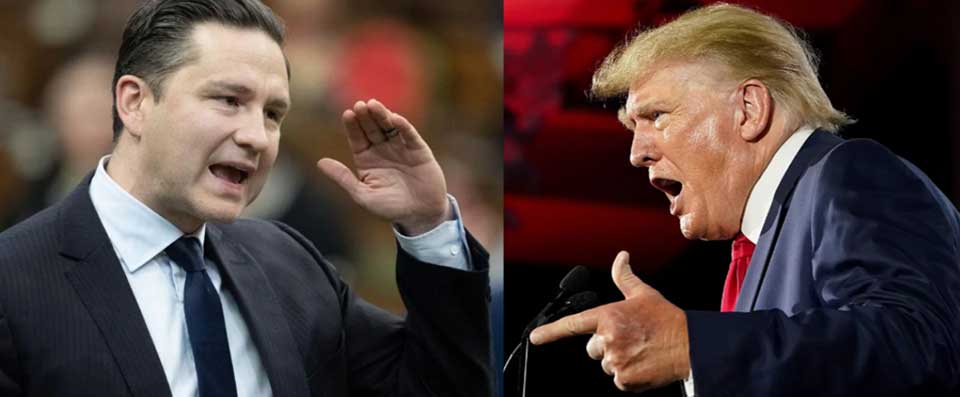Here is what Canada can expect if it follows in the footsteps of the US elections
19 de Noviembre de 2024 a las 16:22
Photo courtesy of Saltwire.com
By Eduardo Harari
Toronto. - Pierre Poilievre, the leader of the Conservative Party of Canada, and Donald Trump, the former President of the United States, share several similarities in terms of their political approach, communication style, and key policy positions. While they operate within different national contexts and have distinct political careers, their rhetoric and strategies often resonate with similar segments of the electorate. Below are some notable similarities between the two:
1. Populist Appeal
Both Poilievre and Trump have cultivated a populist image, positioning themselves as outsiders who speak for "the people" against the "elite" or establishment. They often portray themselves as champions of ordinary citizens, using direct language that resonates with working-class voters. This populist rhetoric is aimed at rallying support from those who feel left behind by globalization, political correctness, and the perceived excesses of the political establishment.
- Trump leveraged the slogan "Make America Great Again," tapping into a sense of nostalgia for a more prosperous and simpler time.
- Poilievre similarly plays on dissatisfaction with the political establishment, often criticizing Canada's ruling Liberals and Prime Minister Justin Trudeau, portraying himself as a voice of fiscal responsibility and common sense.
2. Anti-Elite and Anti-Establishment Stance
Both figures have been vocal critics of political elites and institutions, positioning themselves as opponents of the "Washington" or "Ottawa" establishment, which they claim is out of touch with everyday citizens.
- Trump regularly attacked the "Deep State" and Washington insiders, framing his presidency as a fight against the entrenched political class.
- Poilievre often targets the Liberal Party and the political elites in Canada, particularly Trudeau, accusing them of being out of touch with the needs of ordinary Canadians, especially when it comes to issues like inflation, taxes, and the cost of living.
3. Strong Use of Social Media and Direct Communication
Both Poilievre and Trump are known for their unconventional use of social media as a primary means of communication. They bypass traditional media outlets and speak directly to their supporters, often using platforms like Twitter (Trump) or X (Poilievre) to make announcements, attack opponents, or share their views. Their social media presence is marked by frequent, blunt, and often provocative messages.
- Trump was notorious for his frequent and unfiltered use of Twitter, using it as a direct channel to his base, sometimes for controversial or inflammatory comments.
- Poilievre has adopted a similar approach, using platforms like X to mobilize his supporters, criticize political adversaries, and share personal opinions that might not make it into traditional news outlets.
4. Opposition to Progressive Policies
Both Poilievre and Trump have taken strong stances against progressive policies, particularly those related to climate change, environmental regulations, and social welfare programs. They often present these issues as part of a broader narrative about government overreach and the financial burden of progressive initiatives on taxpayers.
- Trump consistently opposed climate change regulations, withdrew the U.S. from the Paris Climate Agreement, and rolled back many environmental protections during his presidency.
- Poilievre has similarly been critical of green energy policies and carbon pricing, which he claims hurt Canadian businesses and consumers. He has positioned himself as an advocate for a "balanced" approach to environmental policy, one that doesn't penalize the economy.
5. Controversial and Provocative Language
Both leaders are known for their provocative language, which often generates media attention and stirs controversy. This approach is a key component of their political strategies, as it helps them stand out in an increasingly crowded media landscape.
- Trump was infamous for using inflammatory language, including personal attacks on political opponents, the media, and other public figures. His rhetoric often appealed to his base by expressing anger or frustration in ways that felt direct and unfiltered.
- Poilievre has also been known for sharp rhetoric, particularly when addressing the current Liberal government or Canada's media. He uses similar populist language, sometimes invoking harsh critiques of the state of Canadian politics or the economic policies of his rivals.
6. Focus on Economic Issues
Both Poilievre and Trump have made economic issues central to their political messaging. They advocate for policies that they claim will benefit the average working citizen, such as reducing taxes, limiting government spending, and deregulating industries.
- Trump prioritized tax cuts, particularly for corporations and high-income earners, and was a strong proponent of reducing regulations to encourage economic growth.
- Poilievre has similarly campaigned on fiscal conservatism, promising to reduce government spending, lower taxes, and create a more business-friendly environment in Canada. His criticism of inflation and high living costs is often paired with calls for reducing the size of government.
7. Challenging the Media
Both figures have frequently clashed with the mainstream media, often accusing journalists of bias and spreading misinformation. This has helped them connect with their supporters, who view them as victims of a media that they perceive as hostile or unfair.
- Trump famously labeled media outlets like CNN and The New York Times as "fake news" and accused journalists of having an agenda that opposed his presidency.
- Poilievre has similarly attacked certain media outlets, accusing them of being biased against him and misrepresenting his positions. He often frames himself as being unfairly attacked by the media, positioning himself as a defender of free speech.
8. Defender of National Sovereignty
Both Poilievre and Trump present themselves as strong defenders of national sovereignty, opposing international agreements or organizations that they believe threaten their respective countries' interests.
- Trump adopted a nationalist "America First" policy, withdrawing the U.S. from several international agreements and questioning the value of international organizations like NATO.
- Poilievre has similarly criticized international trade deals or policies he believes undermine Canadian sovereignty, particularly those related to global climate agreements or migration policies.
Conclusion
While there are important differences between Pierre Poilievre and Donald Trump in terms of their political backgrounds, the countries they serve, and some policy specifics, their similarities in rhetoric, populism, and opposition to the political establishment are striking. Both leaders have used their platforms to mobilize a base of disaffected voters, promising to challenge the status quo and restore power to ordinary citizens. Their ability to appeal to emotions, employ provocative language, and challenge the media and political elites are key features of their political styles.











Comentarios
escribenos